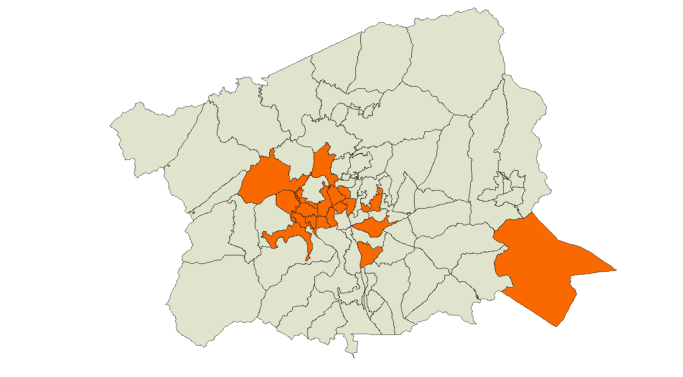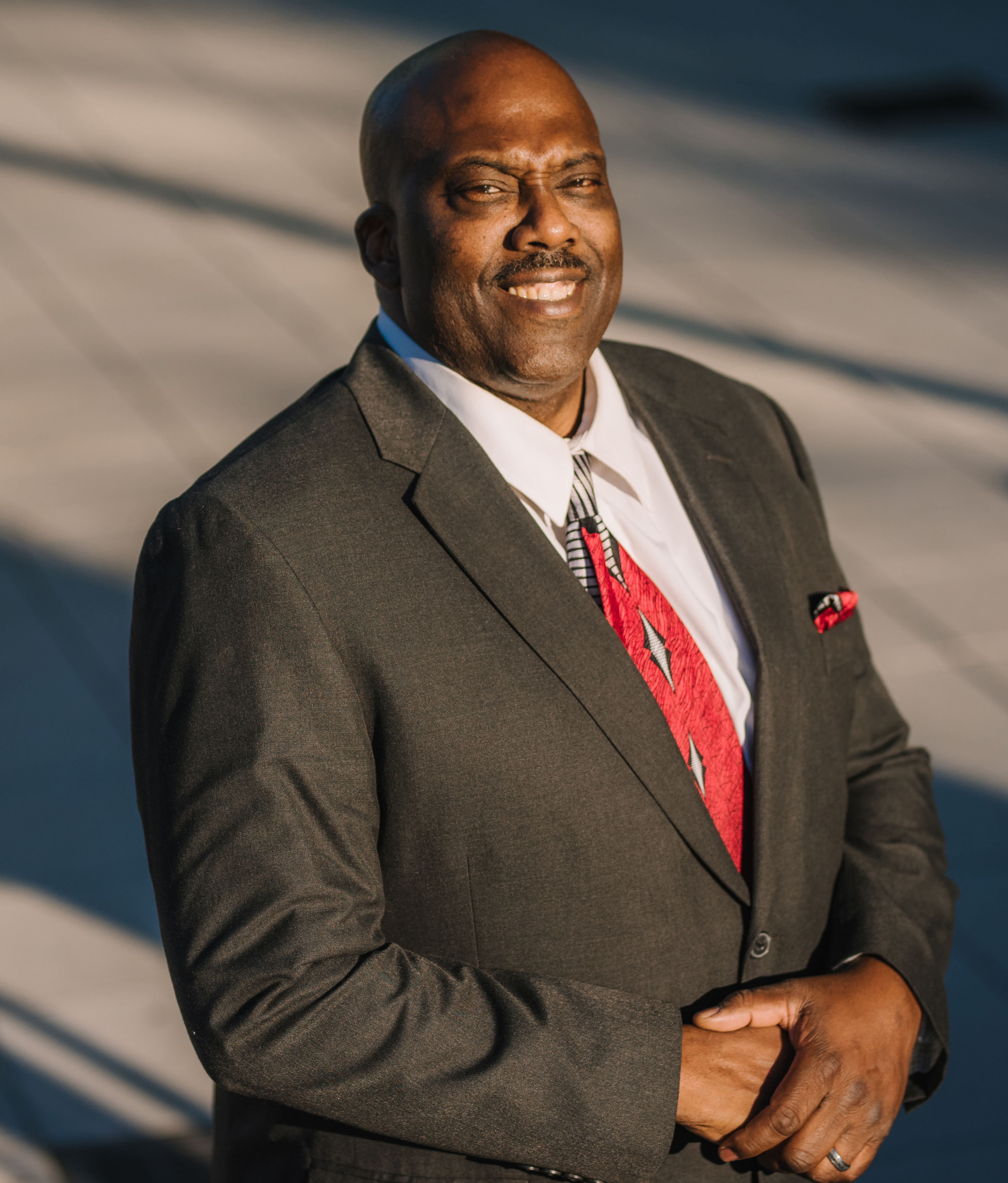


The District Attorney and Sheriff’s primaries cast an illuminating light on the divides in our area — and some of the fights that lie ahead
Above: the map of election results from the Democratic primary between incumbent Todd Williams and challenger Ben Scales. Precincts that went for Williams are marked in beige, orange marks those that went for Scales.
Elections are illuminating things. In the complicated swirl of politics, they’re a rare definite, fixed point, a demonstration of who will and won’t show up to the polls, which appeals do or don’t mobilize people, how well organized a given cause or faction might be when it comes to their power at the ballot box.
Of course, delving into what that information actually shows can be as complex as parsing the meaning of anything that happens in the 90 percent of politics that doesn’t take place during election season. Two key primaries that happened this past Tuesday — for District Attorney and Buncombe County Sheriff — certainly prove both these points. They reveal a lot, but in some ways that aren’t immediately obvious.
The race for the courthouse
District Attorney might be the most powerful single position on the local ballot, with wide-ranging powers over how the justice system does (or doesn’t) work, who it targets and what it prioritizes.
This year’s contest was a rematch. Four years ago, Todd Williams swept longtime right-wing DA Ron Moore in the Democratic primary, drawing on support from party “progressives” (basically the center and some of the center-left who are heavily involved with local politics) as well as many left-leaning and African-American voters. In the general election he faced local attorney Ben Scales, who ran as an independent. While Scales has a long history of civil liberties stances and pushing for marijuana legalization Williams won the general election that year handily as well.
But a lot’s happened in those four years, and this year opened with Williams’ support far shakier than before. His delay in pressing charges against the APD officer who brutalized Johnnie Rush led to a torrent of public controversy. He also faced criticisms that on some key fronts like equity, his office was business as usual rather than the promised reforms. Williams didn’t help matters when he refused to show up for a major local campaign forum (he later would appear at one organized by the local bar association).
This time, Scales ran against Williams in the Democratic party primary. Scales harshly criticized Williams and campaigned well to the left of the incumbent, citing Philadelphia District Attorney Larry Krasner as the model for what he’d do if elected. Scales promised to end the prosecution of almost all marijuana cases, push back against cash bail, prosecute domestic violence perpetrators more aggressively, reduce the criminalization of sex work and more.
Williams had his supporters too, who portrayed him as a quiet, pragmatic reformer doing all he could within the confines of North Carolina law and the limits of his office. His campaign pitches emphasized his experience, the trust various local notables had in him and his connections to the local Democratic party.
In last year’s local elections, more organized left-leaning voters placed increasing pressure on centrist Council members. But county primaries are more favorable terrain for centrists and incumbents, as they tend to draw in Democratic partisans (who tend to be center or center-left) and more conservative local areas.
In this case, Williams managed to hold out, but by a far closer margin than a lot of local observers expected. While the incumbent started off with a strong lead in early voting, Scales improved his standing considerably among voters who showed up on election day, and the margins between the two narrowed as results came in. In the end, just over 1,500 votes separated the two candidates (12,956 for Williams against 11,369 for Scales). Honestly, given the scale of the that swing, if there had been a few more weeks of campaigning it would be easy to see the margins dead even or Scales outright winning. For an incumbent with widespread party support, that’s the definition of “too close for comfort.”
Where those results came from might be one of the most important stories of the entire primary. Typically, countywide Democratic party primaries here see a split between the city (which tends to be more sympathetic to “progressive” candidates) and the county (which has historically gone for even more conservative Democrats).
Not this time. Instead Williams and Scales split the city and county in some important and interesting ways. Scales drew support from West Asheville and he won almost every African-American neighborhood (Williams narrowly won the Southside precinct by 14 votes). He also won downtown, Montford, Haw Creek and the parts of North Asheville that aren’t almost entirely white and still have some swaths of working class renters left. Notably, he also won outlying areas to the west and north of the city where cash-strapped Ashevillians (who tend to be more left-leaning voters) have been pushed by rising housing costs. Scales also performed far better among newer voters and late deciders.
But Williams had his own base of support. He did well in the county and most small towns, South Asheville and the wealthier parts of North and East Asheville. He also drew extensive support from Democratic party stalwarts, who tend to vote early and in higher numbers during a primary.
It was enough. But it marks a major change from four years ago, where Williams mustered a broad coalition and drew significant support from black voters. He goes into a second term with less of a base, facing far more public scrutiny and criticism than before.
Importantly, the results of the DA’s race also have implications for the local election next year. Any centrist Council member probably shouldn’t be sleeping too soundly. The coalition of left-leaning voters that shook up city politics and put the old “progressive” consensus under serious pressure rallied for Scales despite limited resources and a fairly short campaign season. For candidates or organizations that can muster that support, they remain a formidable force.
New sheriff in town
On the surface, the Buncombe County Sheriff’s primary would seem radically different from the DA’s race. Rather than two candidates and a fairly close race, you had five Democratic candidates but one who racked up more votes than all his competitors combined. Instead of a sharp divide between Asheville’s centrists and “progressives” against left-leaning voters, the sheriff’s race had both groups largely rally behind a single candidate.
Asheville Police Department Sergeant Quentin Miller was the overwhelming victor here. He’s the first African-American major party candidate for the position and, if he wins in November, Buncombe County’s first black sheriff.

APD Sgt. Quentin Miller drew together a broad coalition and won a resounding victory in the primary for Buncombe Sheriff.
The office’s history demonstrates the power, often used for ill, of the position. From 1994-2006 former Sheriff Bobby Medford ran the office like his own corrupt personal fief, running protection rackets for illegal gambling, threatening protesters and covering up domestic violence allegations against his son.
He was finally swept out by current Sheriff Van Duncan, and Medford’s now serving 15 years in federal prison for his corruption. Over three terms Duncan (who declined to run for a fourth) would become one of the county’s most popular Democratic officials. Largely dodging the scandals and internal upheaval that hit the APD over the past decade, Duncan cultivated an image as a reformer, cleaning house after Medford’s tenure, bringing in body cameras and proclaiming that he would swiftly hold accountable any deputy guilty of misconduct.
While indisputably a vast improvement over his predecessor, Duncan’s office has drawn more fire in recent years. It has its own problems with racial disparities (though not as severe as the APD, which has one of the worst records in the state), Latinx activists have asserted that some deputies target their community arbitrarily and Duncan bitterly denounced a proposal from three county commissioners to ensure basic transparency in local law enforcement.
Duncan’s chosen successor was Randy Smart, a veteran of the office who claimed he’d continue a tradition of efficient, accountable law enforcement. But Smart also faced accusations of misogyny from a former employee.
Smart faced four other competitors for the job. Miller quickly mustered significant backing from both “progressive” factions within the Democratic Party (including longtime local campaign operatives) and left-leaning voters. Miller touted his commitment to further reforms, especially a greater level of racial equity and a shift away from a “warrior” mentality. He wasn’t the only candidate trying to portray himself as representing a new, more progressive direction. Former APD Capt. R. Daryl Fisher vocally opposed recent ICE raids and welcomed the commissioners’ transparency proposals. But while Fisher got some support from local progressives, Miller drew the lion’s share.
It wasn’t uncommon to see politically active Ashevillians split over the DA’s race but still declare their support, nearly across the board, for Miller. Indeed, that level of support showed in the primary results; he swept the city and almost the entire eastern and southern parts of the county as well. While Miller was partly helped by the inability of his opposition to rally around a single candidate (Smart garnered Duncan’s endorsement but not his popularity) he still tallied up more votes than all his rivals combined.
So if, as seems likely, Miller will win in November, he’ll go into office with broad support. But the story, of course, won’t end there. The office has far more powers than a police chief to directly hire and fire their deputies, but it remains to be seen how drastic a level of change Miller can — or will — pursue.
After all, he has defended embattled APD Chief Tammy Hooper despite major problems with her record on transparency and racial equity. He also, in the Blade questionnaire, said he didn’t support the commissioners’ transparency proposals (though he didn’t condemn them as Duncan did) and that he’d still accept military surplus for use by local law enforcement. That means that, if he prevails by a similar margin in the general election he may also end up on a collision course with the goals of many of his supporters.
The problems with American policing, as an institution, run deep. At the end of the day, everyone running for the office of Sheriff remains deeply steeped in that culture. The election is just the beginning.
—
The Asheville Blade is entirely funded by our readers. If you like what we do, donate directly to us on Patreon or make a one-time gift to support our work. Questions? Comments? Email us.